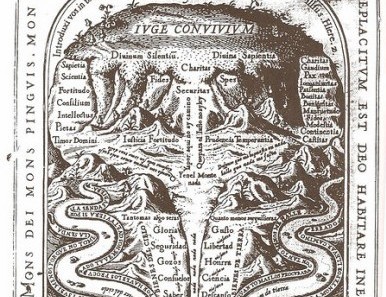Hisptinos: When The Blind Visionaries Strike Again
Jay Mitsche Sepulveda
At first glance, to call someone a “blind visionary” sounds like a gratuitous oxymoron. But this is so only until we look further into it. For someone to have good enough sight to envision new pathways leading to old lands, while being too blind to see that he has arrived at new lands through old pathways—this would surely be the case to prove the point. But for this person to be enough of a visionary to discover a new world while too blind to know what to do with it, makes redundant any further effort to prove the case. From the very beginning, the entire history of the twenty-plus nationalities and/or countries created by the children and grandchildren of the Spaniards who first set foot in the New World, or to call it as its discoverer did, “otro mundo,” has hinged on this oxymoronic knot. Our history can be seen as the result of the clash of civilizations and the massacre, rapine and exploitation that went along with it—or as the result of how the visionary power of the discoverers was consistently thwarted by their blindness. Yes, I know that some would say that no “discovery” took place, only a conquest. But something that has not yet been discovered can never be conquered. Indeed, it could be argued that this clash and its sequel came about because of the interplay of vision and blindness in the discoverers-cum-conquerors; it did not have to be that way by necessity—and our history would have been different.
Having obtained more than they had bargained for, blinded by the brilliance of gold, the Spaniards squandered their gains and, instead of turning this otro mundo into the ultramarine version of their own world—I mean of their selfhood, through taking effective possession of it, they limited themselves to taking possession of what they found in it ready for the taking, creating nothing, developing nothing and producing nothing, and worse, not even reproducing themselves, which is how an effective possession would have come about. To fully grasp what the concept of “effective possession” entails, consider how the British Puritan who settled in what he was to call New England acted in this process; consider also the end result. Briefly put, the English Puritan, that true and sole conqueror who took possession of a world already discovered, was effective at building a unique, unified nation and at fostering the material and political conditions for the emergence of his distinctive identity. On the other hand, the Spaniard, a true discoverer and only incidentally a conqueror, failed to create the conditions under which the Hispanic identity could be reproduced unfettered and so ended up misplacing his ethnos. But his policies or lack thereof led to the misplacing of his ethnos in a continent that bears neither his nor its own name, and to our emerging into the world as a scattered and flag-splintered ethnicity, into nations that, apart from a language, share only the various degrees of rancor and sympathy that bring them closer or farther apart from their originators—and from each other. To say that ours is a flag-splintered ethnicity is to say that our ethnic identity is no such thing but only another oxymoron, a splintered identity: “Hispanic” is what we are called by the other; to ourselves, we are Mexicans, Puerto Ricans, Cubans, and so on. Sometimes rhetoric has an inextricable link to reality.
We try to solve the problems that a flag-splintered ethnic identity poses by resorting to calling ourselves “Latinos,” while ignoring, or pretending to ignore, that this too is a name given to us by the other, namely, by the French—just before the invading Napoleonic troops were defeated by the Mexican army. And so, we have failed to find a name for ourselves that makes historical sense. It is more than just a curious happenstance that Colón, The Discoverer, who in the true sense of the word was the first and last Latino to ever set foot in the New World, was also in the habit of giving himself different names depending on the land he found himself in (Italy, Portugal, Spain, Hispaniola and again, Spain), until he died bearing a cryptic name that till this day keeps historians baffled as to its meaning. We have the right to wonder whether it is also by chance that he comes across as the epitome of the visionary blindness of the Spaniards. Although to tell the truth, The Discoverer showed more vision where the Spanish crown showed more blindness.
And now the blind visionaries strike again. To be sure, they’ve been striking for hundreds of years. The well-known Bolivarian project of a collective ethnic identity in South America, which, to put it thusly, exploded in New Granada, suggests that our visionary blindness might be congenital; it is very telling that the project died in a city with such a name. Not unlike our Iberian ancestors, we are continually envisioning what things will look and feel like in a hypothetical future in the Americas while revealing our blindness as to how to arrive at that future. Or conversely, we just walk down every pathway we see without envisioning where it will lead. Even in the USA, in the situation of the descendant from the Spaniard, and of his victims, we can perceive an echo of the failure of the Bolivarian project. For, whether in California or New York, we deceive ourselves into believing that merely being of Spanish descent, that having “Sánchez,” “Martínez” or “Alvarez” for a name endows you with an ethnic consciousness, and therefore an identity, ignoring that “identity” is not a genetic attribute but a social practice, a way of living, feeling and thinking: an empirical mode of being. And this means: to be Hispanic, or if you prefer, Latino, one has to live like one. Every culture or ethnos lives and dies differently. But again, nobody lives as “Hispanic” or, if you prefer, “Latino.” We live only as Dominicans or Argentines, as Colombians or Salvadorians or Mexicans, or if allowed to, as Americans. In group identity, it’s not the name one is called that counts, but the name to which one responds. This suggests that insofar as we remain an ethnic group splintered by national flags no project that depends on a collective ethnic identity will succeed. Failing to see this constitutes the blindness that endangers whatever vision of the future we might have; it is this blindness that makes us see visions. Seeing visions, though, does not make us visionaries in the strict sense of the word. The question forces itself on us then: how do we overcome this hurdle?
As Bolivar found out in his time and Hugo Chávez is finding out in ours, there’s no easy answer and maybe there’s no answer at all. That is on the international front, though; but what about on the domestic one? I’m afraid that things don’t get any better there, au contraire. The question above, one surmises, is intrinsically related to another question that is rarely stated overtly, but that is on the tip of our tongue every time we say a word, or speak in silence. It goes like this: if we, the descendants of the Spaniard and of his victims (who, in view of what has already been established at this point, one does not know what to call, since “Hispanic” or “Latino” won’t do—“Hisptinos,” perhaps?), have been a part of the United States for hundreds of years, why have we never become an instrumental leverage for power, political, economical or otherwise? Call it the five-hundred-year question. Unable to find a satisfactory answer, we have traditionally resorted to the classical expedient of blaming the other. Our mistaken assumption that ‘the other’ denies us our share in power turns us into blind visionaries. We convince ourselves that since America is a democracy, the more numerous we are, the more political power we should be able to acquire, which we could then parlay into the economical prowess that could reverse almost five hundred years of getting nowhere, or not too far. We therefore stake our fate on multiplying ourselves by legal and illegal means, by biological reproduction and immigration. Endless self-reproduction is our idiosyncratic way of striking. We cannot see that as noble and legitimate as these visions might be, the more numerous we are, the poorer we become, and the poorer we become, the farther we move from materializing those visions. We become poorer because, our population being composed mostly of low-paid hands, the larger our population, the lower the pay gets, since those hands compete against each other for the available jobs. And, to bring things full circle, fewer jobs means less money; less money leads to less education; less education means more low-paying jobs, and on and on, as if caught in a Dantean circle. It should go without saying that the poorer we get the less likely it is that we can make the American type of democracy work for us. And if so, just as happened to the Spaniards, our blindness thwarts our visions: we are not their grandchildren for nothing.
It should be easy to see that this isn’t an academic problem, although it is nonetheless true that many Hispanic, or should one say, Latino, but in any case, “Hisptino”— scholars have been wrestling with it for years, with varying degrees of misunderstanding. Therefore, as one is likely to find overtly or implicitly posited in the literature these scholars have thus far produced, since our Anglo-Saxon “other” has robbed us of our share of political and economical power, the only resort left to us to turn the tables on him is through the endless reproduction of our “Hisptino” population, in the hope that, eventually converted into enough votes, we can give him his comeuppance, to strike back at him, that is. But here we fail to see that in the political system designed by our Anglo other, the populace elects, and the opulent selects; or put another way: the popular classes elect the politicians; the opulent ones select the policies. As long as such laws continue to govern the democratic game in America, real political power will keep eluding us. And as long as we remain fundamentally an army of low-paid hands holding low-paying jobs, we will continue to ask the five-hundred year question about our powerlessness, regardless of how many millions we become. It is obvious, then, that in order to acquire real political power some level of economic autonomy and prowess is needed. But, congenital blind visionaries that we are, our visions hide from us what we are looking forward to seeing.
Should we allow ourselves a gush of fresh thinking, perhaps we could entertain the possibility that the question of power, political or otherwise, is in the end a question of cultural values, of ethnic idiosyncrasies, manners and mores—and not just of numbers. As the histories of the most politically powerful ethnic groups attest, and not only in the USA, certain cultural values have always had the potential of fostering the prerequisites for material wealth to develop and accrue and prevail over the political establishment. In a nutshell, without assimilating the cultural values of the Protestant work ethic, all we can ever expect to get is pork-barreling and horse-trading: political handouts, the political equivalent of social welfare, although with a bit of sweating during the sessions of back-room dealings. To be sure, “work ethic” should not be confused with being “hardworking,” as is usually the case in Hispanic, or should one say, Latino thinking. Rather, work ethic, as the shorthand of the system of cultural and moral values of our Anglo other, means not just working hard but instinctively knowing what to work hard on and what to work hard for. It is, then, a modus vivendi as much as it is a modus operandi.
“Assimilation” is the one concept many in the Hisptino intellectual establishment abhor—that, we know. The way they see it, only a well-off Latino, or for that matter, a Hispanic CEO would be partial to the concept, and they might be right. What they cannot see though, is the question their rejection of the concept begs: do you assimilate yourself to the values of our Anglo other because you are well-off, or you are well-off because you assimilated yourself (your values) at some point? If in doubt as to the right answer, just consider that those of us who say no to assimilation are precisely worse-offs trying not to be, or wishing we weren’t—spokespersons for low-paid hands dreaming of getting the upper hand in order to become well-offs.
Then, whether we can ever overcome the hurdle that a flag-splintered ethnic identity poses is rendered moot by merely thinking things afresh. That we cannot even be sure whether we are “Hispanics” or “Latinos,” self-evidently not the same thing, and that we cannot agree on the name the hypothetical identity of our ethnos ought to bear, should give us pause and make us think things afresh. Maybe “Hisptinos” would do. Striving to enlarge our numbers might help in sending a couple of politicians to Washington, say, to do back-room pork-barreling. But since the question of power is not necessarily just a question of numbers (one must also know how to count, and how counting works), this would be getting less than we are bargaining for and, blind visionaries as our Spaniard forbearers were—we might squander even that. Or else, we could keep growing in number and striking again and again until the doors of Rome are brought down. Then what? Rome might get sacked, but that might not make us any richer, while making everybody else poorer. And so, what began as a gratuitous oxymoron would end as a sad, puzzling irony. Often rhetoric is inextricably linked to reality.
– This article is an adaptation from The Reluctant Americans, a book in search of a publisher.
Posted: April 9, 2012 at 4:20 am










